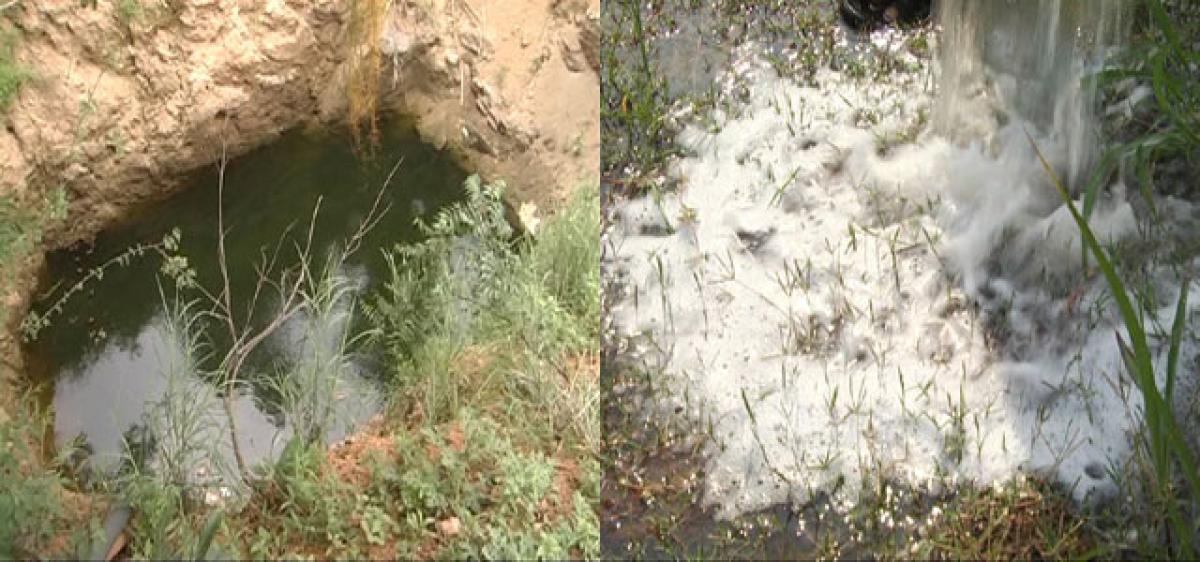Live
- BJP wins five Rajasthan bypolls seats, Congress one
- VHP's 'Sant Samavesh' discusses Waqf issue, religious conversions, autonomy for temples
- Famous Chinar boat race organised in J&K's Dal Lake
- Entire Maharashtra behind PM Modi: Devendra Fadnavis
- Tragic Road Accident in Anantapur District Claims Four Lives
- I bow down to voters' decision: Kumaraswamy’s son on bypolls defeat
- Priyanka's resemblance with Indira Gandhi only in appearance: Robert Vadra
- NDA predicts victory in 2025 Assembly elections after winning Bihar bypolls
- Rahul Gandhi failed once again: Pralhad Joshi on poll results
- Jarange-Patil's pro-Maratha reservation cry fails to hamper MahaYuti’s performance
Just In

Choutuppal, Pochampalli and Chityal mandals in Nalgonda district are on the verge of becoming another Patancheru, the hotbed of pollution. About 75 industries, particularly pharma ones, have been polluting air and land besides contaminating water.
Nalgonda: Choutuppal, Pochampalli and Chityal mandals in Nalgonda district are on the verge of becoming another Patancheru, the hotbed of pollution. About 75 industries, particularly pharma ones, have been polluting air and land besides contaminating water.
The Choutuppal Revenue Division where agriculture was once the main activity has become unfit for cultivation now. The alarming increase in the pollution levels in the three mandals has been subjecting the residents to untold problems.
Residents across the three mandals allege that the Telangana State Pollution Control Board (TSPCB) has failed to regulate the pollutants discharged from the pharma industries and turned a blind eye to the public health which was posing grave threat.
The pollution threat has been so serious that none is offering brides/grooms to the families of these areas in matrimony.
As many as 75 pharma, bulk drug, chemical and other units are located in Choutuppal, Pochampalli and Chityal mandals. The industries are not located in clusters, but are spread indiscriminately. The owners of the industries who are allegedly hand in glove with the corrupt officials have succeeded in getting permission to locate the units according to their will.
The industries are even discharging the pollutants using tankers and other means without treating them which is against the norms. People of these areas allege that politicians of both ruling and Opposition parties are supporting such industries.
Residents across three mandals claim that the groundwater has been severely affected by pollutants discarded by the pharma industries which are not fit for either drinking or for domestic purposes. Innumerable complaints to the State Pollution Board have fallen on deaf ears.
As a result, the farmers and residents of these areas hired a private agency to test the pollution and contamination levels. In the investigation, the agency has found that the pollution levels were 1,000 mg to 2,000 mg when dissolved in one litre of water.
As per the norms, it should not cross 500 mg. The agencies claimed that none of the pharma industries has been using treatment plants and has contaminated ground water levels. Some industries even have dug pits to get rid of pollutants from their vicinity while some others have appointed agents to transport their wastes.
Bal Reddy, a farmer of Dharmojigudem, in Choutuppal mandal, told The Hans India that 20 years back he used to cultivate his ten-acre land. ‘I had hoped that the area would develop economically if the industries come up but sadly the land and groundwater got polluted. The water is unfit for agriculture. What is worse the grass grown here is also not fit for cattle.
Reddy said he and many others have no option but to keep his land idle. “We don’t allow the cattle also to graze in those lands,” he said.
Mallamma, a farm labourer of Dothigudem in Boodhan Pochampalli mandal, said that she was facing severe knee problem due to water pollution. She said she was also suffering from lung and breathing problems.
Ram Reddy, a poultry farmer of the same village, said because of polluted water his fowls located in two acres are not surviving. He said many farmers like him have been forced to shut their poultry units. Mallesh Yadav, sarpanch of Dothigudem, told The Hans India that the firms were refusing to enter into agreement following more deaths of chicks.
When The Hans India drew the attention of N Ravinder, Senior Environmental Scientist, to the issue, he said the TSPCB has asked the National Engineering and Research Institute (NERI) to study the causes and their effects of pollutants discharged from the industries. He said the NERI would submit a report on the pollutants shortly and further action would be initiated by the PCB after getting the report.

© 2024 Hyderabad Media House Limited/The Hans India. All rights reserved. Powered by hocalwire.com







